Related Research Articles
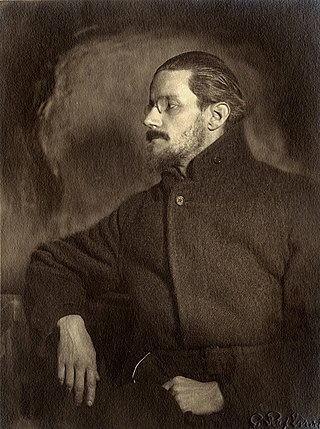
James Augustine Aloysius Joyce was an Irish novelist, poet, and literary critic. He contributed to the modernist avant-garde movement and is regarded as one of the most influential and important writers of the 20th century. Joyce's novel Ulysses (1922) is a landmark in which the episodes of Homer's Odyssey are paralleled in a variety of literary styles, particularly stream of consciousness. Other well-known works are the short-story collection Dubliners (1914), and the novels A Portrait of the Artist as a Young Man (1916) and Finnegans Wake (1939). His other writings include three books of poetry, a play, letters, and occasional journalism.
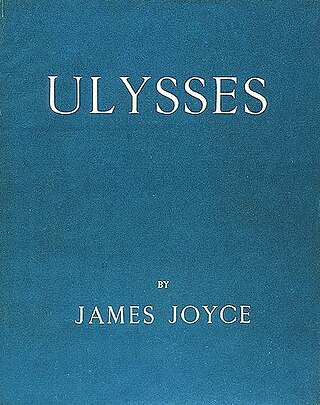
Ulysses is a modernist novel by Irish writer James Joyce. Parts of it were first serialized in the American journal The Little Review from March 1918 to December 1920, and the entire work was published in Paris by Sylvia Beach on 2 February 1922, Joyce's fortieth birthday. It is considered one of the most important works of modernist literature and has been called "a demonstration and summation of the entire movement." According to Declan Kiberd, "Before Joyce, no writer of fiction had so foregrounded the process of thinking."

Leopold Bloom is the fictional protagonist and hero of James Joyce's 1922 novel Ulysses. His peregrinations and encounters in Dublin on 16 June 1904 mirror, on a more mundane and intimate scale, those of Ulysses/Odysseus in Homer's epic poem: The Odyssey.

Bloomsday is a commemoration and celebration of the life of Irish writer James Joyce, observed annually in Dublin and elsewhere on 16 June, the day his 1922 novel Ulysses takes place in 1904, the date of his first sexual encounter with his wife-to-be, Nora Barnacle, and named after its protagonist Leopold Bloom.

Dubliners is a collection of fifteen short stories by James Joyce, first published in 1914. It presents a naturalistic depiction of Irish middle class life in and around Dublin in the early years of the 20th century.
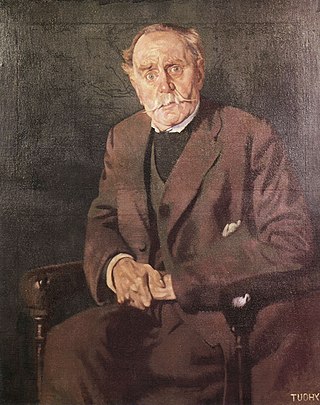
John Stanislaus Joyce was the father of writer James Joyce, and a well known Dublin man about town. The son of James and Ellen Joyce, John Joyce grew up in Cork, where his mother's family, which claimed kinship to "Liberator" Daniel O'Connell, was quite prominent.

Nora Barnacle was the muse and wife of Irish author James Joyce. Barnacle and Joyce had their first romantic assignation in 1904 on a date celebrated worldwide as the "Bloomsday" of his modernist novel Ulysses, a book that she did not, however, enjoy. Their sexually explicit letters have aroused much curiosity, especially as Joyce normally disapproved of coarse language, and they fetch high prices at auction. In 2004, an erotic letter from Joyce to Barnacle sold at Sotheby's for £240,800.

Molly Bloom is a fictional character in the 1922 novel Ulysses by James Joyce. The wife of main character Leopold Bloom, she roughly corresponds to Penelope in the Odyssey. The major difference between Molly and Penelope is that while Penelope is eternally faithful, Molly is not. Molly is having an affair with Hugh 'Blazes' Boylan. Molly, whose given name is Marion, was born in Gibraltar on 8 September 1870, the daughter of Major Tweedy, an Irish military officer, and Lunita Laredo, a Gibraltarian of Spanish descent. Molly and Leopold were married on 8 October 1888. She is the mother of Milly Bloom, who, at the age of 15, has left home to study photography. She is also the mother of Rudy Bloom, who died at the age of 11 days. In Dublin, Molly is an opera singer of some renown.
"The Dead" is the final short story in the 1914 collection Dubliners by James Joyce. It is by far the longest story in the collection and, at 15,952 words, is almost long enough to be described as a novella. The story deals with themes of love and loss, as well as raising questions about the nature of the Irish identity.
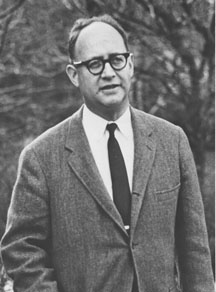
Richard David Ellmann, FBA was an American literary critic and biographer of the Irish writers James Joyce, Oscar Wilde, and William Butler Yeats. He won the U.S. National Book Award for Nonfiction for James Joyce (1959), which is one of the most acclaimed literary biographies of the 20th century. Its 1982 revised edition was similarly recognised with the award of the James Tait Black Memorial Prize. Ellmann was a liberal humanist, and his academic work focused on the major modernist writers of the twentieth century.
"Eveline" is a short story by the Irish writer James Joyce. It was first published in 1904 by the journal Irish Homestead and later featured in his 1914 collection of short stories Dubliners. It tells the story of Eveline, a teenager who plans to leave Dublin for Argentina with her lover.
"Araby" is a short story by James Joyce published in his 1914 collection Dubliners. The story traces a young boy's infatuation with his friend's sister.
"The Sisters" is a short story by James Joyce, the first of a series of short stories called Dubliners. Originally published in the Irish Homestead on 13 August 1904, "The Sisters" was Joyce's first published work of fiction. Joyce later revised the story and had it, along with the rest of the series, published in book form in 1914. The story details a boy's connection with a local priest, in the context of the priest's death and reputation.
Malachi Roland St. John "Buck" Mulligan is a fictional character in James Joyce's 1922 novel Ulysses. He appears most prominently in episode 1 (Telemachus), and is the subject of the novel's famous first sentence: "Stately, plump Buck Mulligan came from the stairhead, bearing a bowl of lather on which a mirror and a razor lay crossed."

Chamber Music is a collection of poems by James Joyce, published by Elkin Mathews in May 1907. The collection originally comprised thirty-four love poems, but two further poems were added before publication.
United States v. One Book Called Ulysses, 5 F. Supp. 182, is a decision by the United States District Court for the Southern District of New York in a case dealing with freedom of expression. At issue was whether James Joyce's 1922 novel Ulysses was obscene. In deciding it was not, Judge John M. Woolsey opened the door to importation and publication of serious works of literature that used coarse language or involved sexual subjects.
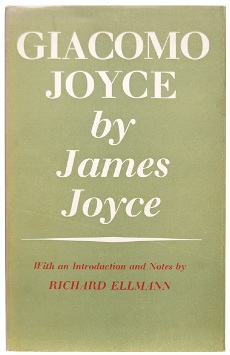
Giacomo Joyce is a posthumously-published work by Irish writer James Joyce. It was published by Faber and Faber from sixteen handwritten pages by Joyce. The text is a free-form love poem that tracks the waxing and waning of Joyce's infatuation with one of his students in Trieste.

David Sheehy was an Irish nationalist politician. He was a member of parliament (MP) from 1885 to 1900 and from 1903 to 1918, taking his seat as a member of the Irish Parliamentary Party in the House of Commons of the United Kingdom of Great Britain and Ireland.
"Two Gallants" is a short story by James Joyce published in his 1914 collection Dubliners. It tells the story of two Irishmen who are frustrated with their lack of achievement in life and rely on the exploitation of others to live. Joyce considered the story to be one of the most important in Dubliners.
References
- 1 2 Wim Van Mierlo (2004). The Reception of James Joyce in Europe (Reception of British & Irish Authors Europe). Londra: Thoemmes Continuum. pp. 317–319.
- ↑ Ellmann, Richard; Barolini, Helen. "The Curious Case of Amalia Popper". ISSN 0028-7504 . Retrieved 2021-12-19.
- ↑ Mahaffey, Vicki (1995). "Fascism and Silence: The Coded History of Amalia Popper". James Joyce Quarterly. 32 (3/4): 501–522. ISSN 0021-4183.
- ↑ "On this day…19 February – THE JAMES JOYCE CENTRE" . Retrieved 2021-12-19.
- ↑ O'Grady, Desmond (1971-12-12). "Joyce: 'Trieste Is Waking Rawly...'". The New York Times. ISSN 0362-4331 . Retrieved 2021-12-19.
- ↑ L'amore triestino di Joyce: non era Amalia ma Emma Cuzzi da Corriere.it
- ↑ Michele Risolo, "Corriere della Sera", 27 febbraio 1969 (vd. anche bartolomeodimonaco.it)
- ↑ Mahaffey, Vicki (1995). "Fascism and Silence: The Coded History of Amalia Popper". James Joyce Quarterly. 32 (3/4): 501–522. ISSN 0021-4183.
- ↑ "James Joyce Encyclopedia". www.jamesjoyceencyclopedia.com. Retrieved 2021-12-19.